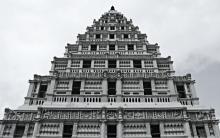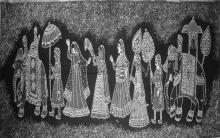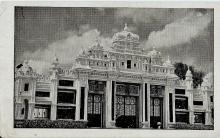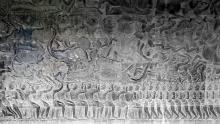ಅಪ್ಪಾಜಪ್ಪ :
Author:Shreesha Karantha
ಮಂಜಯ್ಯ:
ಹೆಣ್ಗಳ ಕಣ್ಣಿನಲ್ಲಿ ಮನ್ಮಥನು ಮನುಷ್ಯರೂಪವನ್ನು ತಾಳಲು ಯೋಚಿಸಿದರೆ ಯಾವ ರೂಪವನ್ನು ತಾಳಬಹುದೋ ಅದೇ ಮಂಜಯ್ಯ. ಆದರೆ ಇವನದ್ದು ಶೃಂಗಾರದ ಮುಸುಕಿನಲ್ಲಿರುವ ವೀರ ಮತ್ತು ಅದರ ಮದ . ಇವನಿಗೆ ಮುಪ್ಪಿಲ್ಲ. ಇವನಿಗೆ ಸೋಲದ ಹೆಣ್ಣುಗಳಿಲ್ಲ. ಆದರೆ ಪ್ರತಿಯೊಂದು ಹೆಣ್ಣಿನ ಸಂಗದಲ್ಲಿಯೂ ಇವನು ಬಯಸುತ್ತಿರುವುದು ದೇಹಪ್ರಕೃತಿಯ, ಕಾಮದ ಚೋದನೆಯ ಈಡೇರಿಕೆಯಲ್ಲ; ತನ್ನ ಅಹಂಕಾರದ ಮೆರವಣಿಗೆ. ಹೆಣ್ಣನ್ನು ಗೆದ್ದೆನೆಂಬ ಹೆಮ್ಮೆಯ ಅನುಭವ. ಇವನ ಹೆಣ್ಣುಬಾಕತನದ ಹಿಂದಿರುವುದು ತೀವ್ರವಾದ ಕಾಮವಲ್ಲ, ಅಹಂಕಾರ. ಹಾಗಾಗಿಯೇ ಇವನ ಈ ದಾಹವು, ಅವನನ್ನು ವಿಕೃತಕಾಮಿಯನ್ನಾಗಿಸಿ, ಮೌಲ್ಯಭ್ರಷ್ಟನನ್ನಾಗಿಸಿ ಸಮಾಜದ ಸ್ಥಾಪಿತಮೌಲ್ಯಪ್ರತಿಮೆಗಳನ್ನು ಲೆಕ್ಕಕ್ಕಿಡದೆ ಒಡೆದುಹಾಕುವಂತೆ ಮಾಡುವುದು.
ಭೈರಪ್ಪನವರ ಕಾದಂಬರಿ “ಸಾಕ್ಷಿ" ಯನ್ನು ಓದುವಾಗ, ಅದು ಚಿತ್ರಿಸುತ್ತಿರುವ ಕಥೆಯ ಬೆರಗು, ಮನುಷ್ಯನ ಧರ್ಮ, ಅರ್ಥ ಮತ್ತು ಕಾಮ, ಅಹಂಕಾರ ಮತ್ತು ಮೌಲ್ಯಗಳ ತಳಹದಿಯ ಪಾತ್ರ-ಪ್ರಸಂಗಗಳ ಚಿತ್ರಣದ ವಿವಿಧ ರೂಪಗಳ ಸೆಳೆತದಲ್ಲಿ, ಗ್ರಾಮೀಣ ಜನಜೀವನ ಮತ್ತು ಸಂಭಾಷಣೆಗಳಲ್ಲಿ ಓದುಗರ ಚಿತ್ತ ಕಳೆದುಹೋಗಿ, ಈ ಕಾದಂಬರಿಯು ಸೂಕ್ಷ್ಮವಾಗಿ, ಸೂಚಿಸುವ - ಪ್ರತಿಯೊಬ್ಬ ಜೀವಿಯಲ್ಲಿ ನಡೆಯುವ/ನಡೆಯಬೇಕಾದ/ನಡೆಯದ - ಮೌಲ್ಯವಿಶ್ಲೇಷಣೆಯನ್ನು, ಅದಕ್ಕೆ ಆಧಾರವಾದ ವಿವಿಧ ರೀತಿಯ ವ್ಯಕ್ತಿಗಳ ಅಹಂಕಾರ ಮತ್ತು ಆತ್ಮಸಾಕ್ಷಿಯ ಸ್ವರೂಪವನ್ನು ಗ್ರಹಿಸದೆ ಇದ್ದುಬಿಡುವ ಸಂಭವವಿದೆ. ಇದಕ್ಕೆ ಕಾರಣ ಕಾದಂಬರಿಯ ವಸ್ತುವಿನ ಆಕರ್ಷಣೆ ಒಂದೆಡೆಯಾದರೆ, ಅದನ್ನು ಅನನ್ಯ ರೀತಿಯಲ್ಲಿ ಪ್ರತಿನಿಧಿಸುವ ಪಾತ್ರಗಳು ಇನ್ನೊಂದೆಡೆ.
क्षुत्तृडाशा इति ख्याता भार्यास्तिस्रः प्रभो मम |
तास्विदं हि कनिष्टायाः प्रियाया नर्मचेष्टितम् ||
कलारत्नं गीतं गगनतलरत्नं दिनमणिः
सभारत्नं विद्वान् श्रवणपुटरत्नं हरिकथा |
निशारत्नं चन्द्रः शयनतलरत्नं शशिमुखी
महीरत्नं श्रीमान् जयति रघुनाथो नृपवरः ||
कतिकति न कुसत्पयः किं ते तु कदापि नायकायन्ते |
कौ पादपास्तु सन्त्यपि किं ते सन्तानपादपायन्ते ||
The Sanskrit word for wedding is विवाह (vivaaha). Vivaaha also means ‘marriage.’ Basically it refers to “supporting dharma.” Dharma is a Sanskrit word that means ‘harmony,’ ‘sustainability,’ ‘righteousness,’ ‘welfare at large’ – in essence, ‘that which is most beneficial to the world.’ The wife is referred to as sahadharmini, an equal partner in upholding dharma and treading the right path. The wedding is typically performed with mantras from the Vedas.
Bidaram Krishnappa (1 September 1866 to 29 July 1931)
In about 1915, I’d been to Mysore on some work. Then the (Mysore) Palace Controller Ballalacaru Ramakrishna Rao sent for me when he learned that I was in town.
R: You must come for lunch tomorrow afternoon. I’ve some work with you.
Me: I’ll be leaving for Bangalore tomorrow afternoon.
वेणीभूतेषु केशेष्वतसिफणिधिया द्रष्टुमागत्य केकी
पश्चादारभ्य योद्धुं प्रतिशिखिमनसा तेषु विस्रंसितेषु |
भूयो धमिल्लितेषु प्रकटघनधिया नर्तनायोज्जजृम्भे
तन्नृत्तालोकनान्मे प्रियसख मम भून्मण्डनश्रीविलंबः ||
Interview with Dr. R Ganesh –Dr. Arundhati Sundar and Arjun Bharadwaj
Arjun Bharadwaj interviewed Shatavadhani Dr. R. Ganesh on the upcoming Summer School at Chinmaya International Foundation on the Theme of Vyāsa - Vālmīki - Kālidāsa: Realizing the Spirit of Indian Culture through their Creations – A Ten-day intensive residential course. http://summerschool2017.chinfo.org/#










